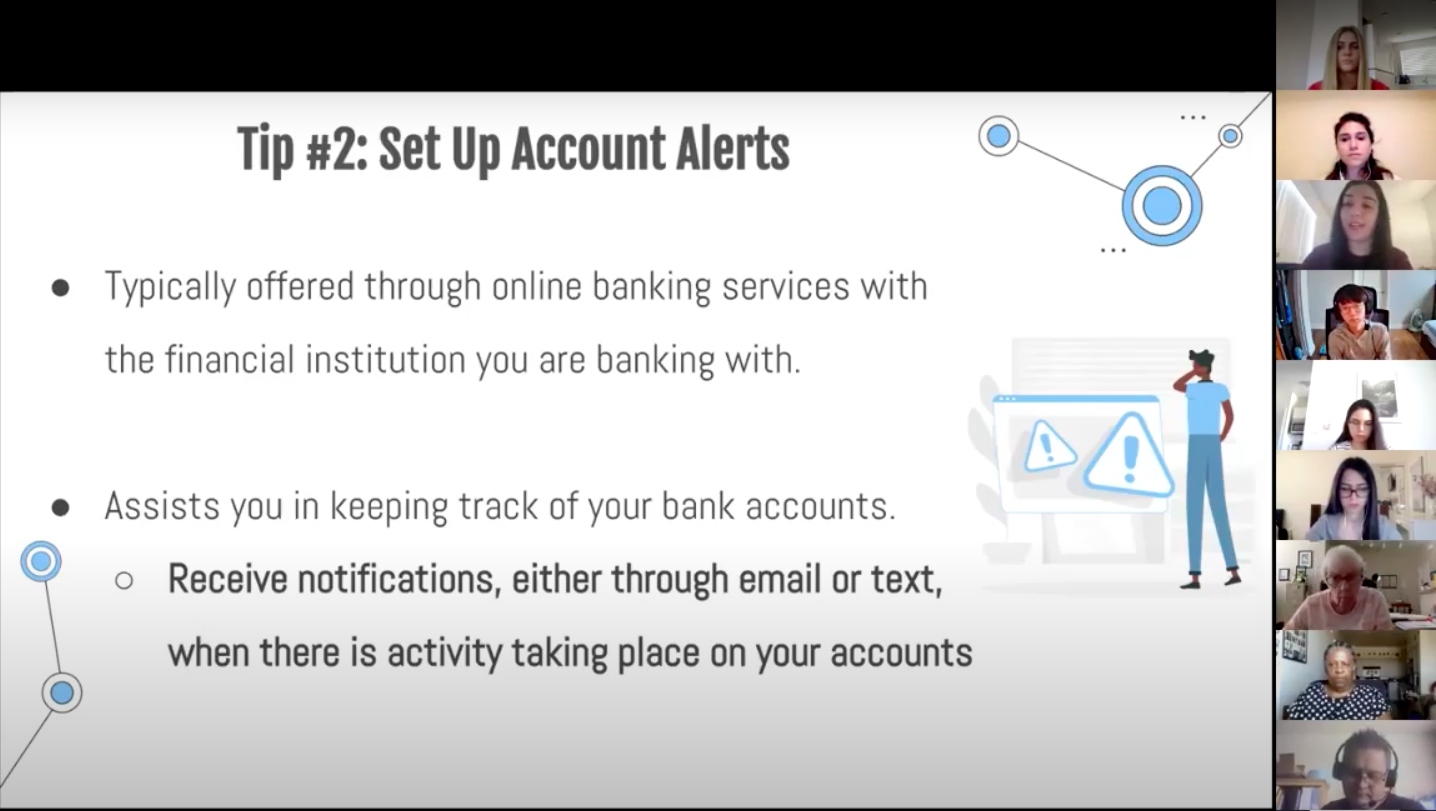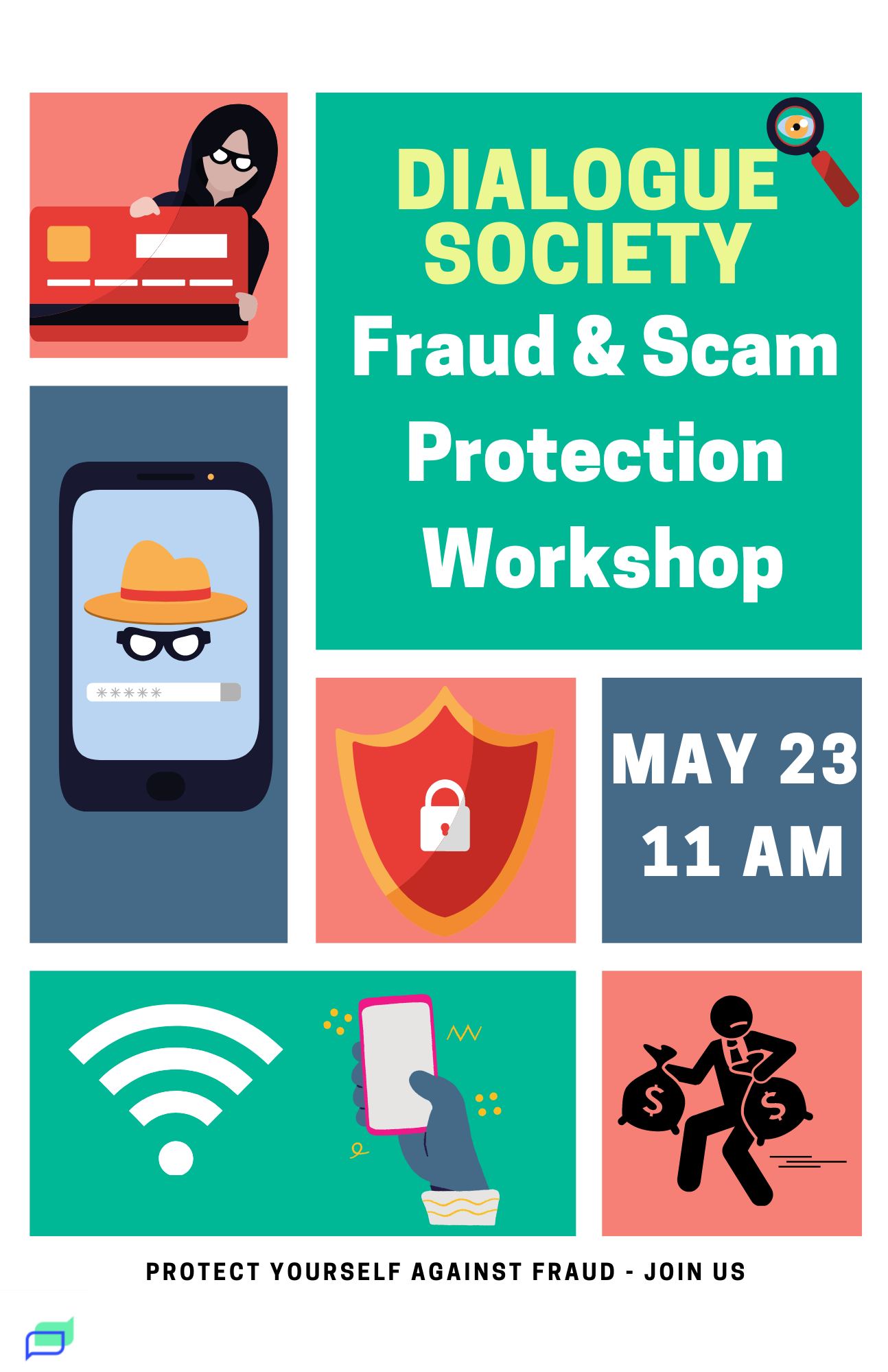By Kara Hoover – UCLA chapter member
On May 23rd, 2021, Dialogue Society at UCLA hosted its second educational workshop on the dangers of scams and fraud and ways to protect oneself from falling victim. Such a presentation is always important but was particularly relevant due to the prevalence of scams in 2020. In fact, the Federal Trade Commission announced that there were more than 2.2 million reports about fraud with losses incurred of nearly 3.3 billion dollars (Vaca, 2021). With the creation of many new scams preying on the fears and vulnerabilities that the coronavirus pandemic evokes, it is no surprise that the number of reports and the magnitude of the losses is so great. To combat such pervasive victimization, Dialogue Society’s presenters Evanjelin Mahmoudian and Emma Ide aimed to educate our fellow members and senior participants in hopes of reducing scams’ egregious effects.
“I was passionate about hosting a workshop around this topic because I work in banking, and I currently see firsthand how often fraud and scams happen every day”
– Evanjelin Mahmoudian
“I have seen friends and family members be victims of internet scams and knew it is an important topic to be educated on, especially with so much of our lives being online”
– Emma Ide

I can only speak for myself, but as a participant of the workshop, I believe that the presenters succeeded in lessening the likelihood of scam victimization among their viewership. They accomplished this by informing us about various types of scams and how to best protect ourselves. I can say that I left the workshop having learned a myriad of tips and facts that I never knew before. For example, I learned how imperative it is to avoid connecting to free public Wi-Fi because almost 70% of hacking incidents occur when connected to an unsecured Wi-Fi network. As disappointing as it may be to no longer blithely use the free Wi-Fi at Starbucks, I am now aware of the potential of fake internet connections and hacking, which can expose my personal information. Additionally, one of the most important tips I learned was how social security numbers could not be suspended, revoked, frozen, or blocked. Thus, anyone asking for your social security number for the aforementioned reasons is most likely trying to scam you. Lastly, it is essential to back up your data via external hard drives or cloud storage as, for most of us, our whole lives are encapsulated in our technological devices and it would be devastating to lose such data. These are just a few of the tips that were shared that articulated the dangers of scams and how to prevent us from falling victim.
“The main thing I wanted people to take away from the workshop is that everyone is vulnerable to experiencing scams/fraud”
– Evanjelin Mahmoudian
According to the Federal Trade Commission, one in ten adults falls victim to a scam every year (Vaca, 2021). There is a common stereotype that older adults are more vulnerable to scams than other age groups, but research on this topic has resulted in mixed findings (Hanoch & Wood, 2021). Regardless of the demographic characteristics that may (or may not) predict susceptibility to scams, what our presenters made clear in the workshop is that anyone can become a victim of fraud. Thus, every person must protect themselves via education. This is why workshops on scams and fraud protection are so important. What makes these workshops even more beneficial is learning from one another, particularly across generations. During the workshop, many of the viewers, both younger and older adults, shared their own experiences and strategies that they use to protect themselves. These discussions were built upon what was learned from the presentation and allowed both the viewers and the presenters to learn something new.
“I learned a lot from hearing about the seniors’ experiences with internet scams and how they went about solving any problems they had run into in the past. Their insight helped to make the presentation even more interesting and personal”
– Emma Ide
Ultimately, workshops, such as the scam and fraud protection awareness, allow for learning to occur between and across generations. We have so much that we can learn from one another, and I, for one, am looking forward to learning more at future Dialogue Society workshops. Please let us know whether you would like us to cover more of these topics in the future, and we would love to hear your feedback or other workshop ideas!
References
Hanoch, Y., & Wood, S. (2021). The scams among us: Who falls prey and why. Current
Directions in Psychological Science, 30(3), 260-266.
https://doi.org/10.1177/0963721421995489
Vaca, M. (2021, February 4). The top frauds of 2020. Federal Trade Commission Consumer Information. https://www.consumer.ftc.gov/blog/2021/02/top-frauds-2020


